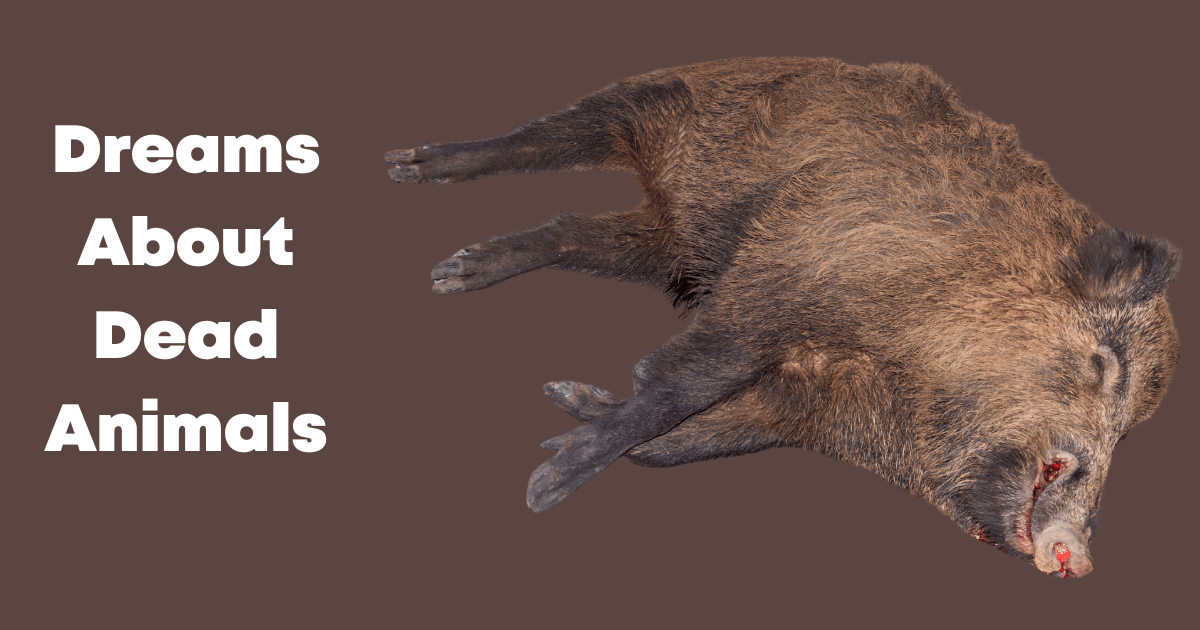Dreams About Dead Animals have long been a source of fascination and mystery, offering a window into the deepest recesses of our minds and souls. Among the myriad themes that dreams may present, those involving dead animals stand out for their emotional impact and the profound meanings they can convey. Such dreams are not only vivid and memorable but also laden with symbolism, touching on aspects of our psyche that are often overlooked or repressed in waking life. This article explores the multifaceted interpretations of dreams about dead animals, drawing from psychological, cultural, and religious perspectives to provide a comprehensive understanding of this complex subject.
Understanding The Meaning of Such Dreams
Dreams about dead animals are rich in symbolism, often reflecting the dreamer’s inner emotional states, fears, or aspects of their personal growth and transformation. Psychologically, these dreams might symbolize aspects of one’s personality that are being neglected or are undergoing change. For instance, dreaming of a deceased pet could represent a loss of innocence or a cherished aspect of oneself that has faded over time. Similarly, the type of animal and its condition in the dream can offer insights into the dreamer’s emotional health and psyche. A dead bird might symbolize lost aspirations or freedom, while a deceased lion could represent a diminished sense of power or authority.
Interpreting Dreams About Dead Animals
Interpreting dreams about dead animals requires considering the dream’s context, the emotions it evokes, and the individual’s current life circumstances. Here are some nuanced scenarios and their possible meanings:
- Dreaming of Dead Pets: Often relates to feelings of guilt, loss, or unresolved grief. It might also reflect fear of losing someone close or the end of an important phase in life.
- Dead Wild Animals: Can symbolize personal challenges, obstacles, or aspects of oneself that are difficult to tame or control.
- Mass Deaths of Animals: May represent overwhelming situations in waking life, feelings of helplessness, or fear of impending disaster.
- Finding Beauty in Death: Such dreams might suggest a coming to terms with mortality or finding peace with endings and transitions.
Why Do People Experience Dreams About Dead Animals?
Dreams about dead animals can arise from various psychological, emotional, and physiological triggers. They may be a reflection of deep-seated fears, anxieties, or unresolved emotions related to death, loss, or change. Psychologically, these dreams could be a manifestation of the dreamer’s processing of grief or adaptation to new circumstances. Emotionally, they might stem from feelings of vulnerability, sadness, or a sense of loss. Physiologically, stress, diet, or environmental factors could also play a role in triggering such dreams, as the body and mind attempt to process and make sense of these internal and external influences.
Spiritual Interpretation of Dreams About Dead Animals
In many spiritual traditions, dreams about dead animals are seen as significant symbols conveying messages from the subconscious or the divine. These dreams might be interpreted as warnings, omens of transformation, or calls to pay attention to one’s health, relationships, or spiritual well-being. For instance, in some cultures, dreaming of a dead animal might be seen as a sign to slow down and reflect on one’s life path and choices, suggesting a need for introspection and realignment with one’s true values and aspirations.
Biblical Interpretation of Dreams About Dead Animals
The Biblical perspective on dreams about dead animals can vary, but such dreams are often viewed through the lens of prophecy, warning, or moral teaching. In Scripture, animals have symbolic meanings—lions represent strength, birds symbolize freedom, and fish are often linked to faith. Thus, dreams of dead animals could be interpreted as a loss or challenge in the area of life that the specific animal represents. For example, a dream about a dead dove might be seen as a loss of peace or innocence, prompting the dreamer to seek reconciliation or purity in their life.
Religious Interpretations of Dreams About Dead Animals
- Islamic Interpretation: In Islamic dream interpretation, animals often symbolize wealth, power, or the primal aspects of the self. Dreams about dead animals could therefore represent the loss or diminishment of these elements in the dreamer’s life. Depending on the animal, such dreams might also be warnings to avoid certain behaviors or to purify one’s intentions. For example, a dead snake might symbolize overcoming an enemy or the end of deception.
- Hindu Interpretation: Hinduism views dreams as significant messages from the gods or as reflections of one’s karmic footprint. Dreaming of dead animals in Hindu culture can indicate a release from karmic debts or the end of a cycle of suffering and negativity. It might also suggest the dreamer is undergoing a spiritual cleansing or liberation from worldly attachments.
- Buddhist Interpretation: Buddhism often interprets dreams as manifestations of the mind’s condition, reflecting one’s thoughts, fears, and desires. A dream about dead animals could signify the dreamer’s recognition of impermanence and the cycle of life and death. It may also encourage the dreamer to detach from worldly desires and to cultivate compassion and understanding.
Cultural Interpretations of Dreams About Dead Animals
- Native American Interpretation: In many Native American cultures, animals are revered as sacred guides and protectors. Dreaming of a dead animal might be interpreted as a loss of guidance or protection, a sign to reconnect with one’s spiritual path, or an invitation to receive a new animal guide.
- African Interpretation: Many African traditions emphasize the interconnectedness of all life, with animals playing vital roles in the cosmos. Dreams about dead animals might be seen as messages from ancestors or the spirit world, indicating changes, transitions, or the need for ritual to restore balance.
- Celtic Interpretation: In Celtic culture, animals are integral to the mythological and natural worlds, often serving as emblems of clans and symbols of traits such as bravery or wisdom. Dreaming of dead animals in a Celtic context might symbolize a disconnection from one’s heritage or natural world, urging the dreamer to reconnect with their roots and the land.
What Psychology Says About Dreams About Dead Animals
Psychologically, dreams about dead animals can be interpreted through the lens of loss, transformation, and the shadow self. Carl Jung, for example, viewed animals in dreams as representations of the instinctual parts of the psyche—the shadow self that one might be ignoring or repressing. Such dreams could indicate the dreamer’s confrontation with this shadow self, urging integration and acceptance of all aspects of their personality. Freudian interpretation might see these dreams as expressions of repressed desires or fears, particularly related to aggression or survival instincts.
Recent research in dream psychology often links the content of dreams to daily experiences, emotions, and stressors. Dreams about dead animals could therefore reflect the dreamer’s anxieties about death, loss, or significant life changes. They might also represent the dreamer’s processing of grief or the symbolic death of something significant, such as the end of a relationship or career.
How to Avoid Dreams About Dead Animals
Minimizing the occurrence of dreams about dead animals involves addressing the underlying emotional and psychological triggers. Practical strategies include:
- Emotional Processing: Actively engage in processing emotions related to loss, fear, or change. Journaling, therapy, and creative expression can facilitate this process.
- Stress Management: Implement stress reduction techniques, such as meditation, yoga, or deep breathing exercises, to reduce the overall stress that might manifest in dreams.
- Sleep Hygiene: Maintain a consistent sleep schedule, create a restful sleeping environment, and avoid stimulants before bed to improve sleep quality and potentially reduce unsettling dreams.
- Mindful Reflection: Reflect on the day’s events and any unresolved emotions before bed, perhaps through meditation or prayer, to clear the mind.
Conclusion
Dreams about dead animals are a rich tapestry of emotional, psychological, and spiritual symbolism, offering deep insights into the dreamer’s inner world. Through understanding the varied interpretations across different religions and cultures, we gain a broader perspective on the meanings behind these dreams. Psychological theories provide a foundation for understanding the personal significance of such dreams, highlighting the importance of emotional processing and self-awareness. By embracing practical strategies to manage stress and emotional unrest, one can mitigate the occurrence of these dreams and navigate their meanings more peacefully. For those recurrently experiencing such dreams, consulting a professional can offer further clarity and support in understanding the intricate messages of the subconscious. Reflecting on these interpretations encourages a journey of self-discovery and personal growth, allowing us to navigate the complex landscape of our dreams with greater insight and compassion.

